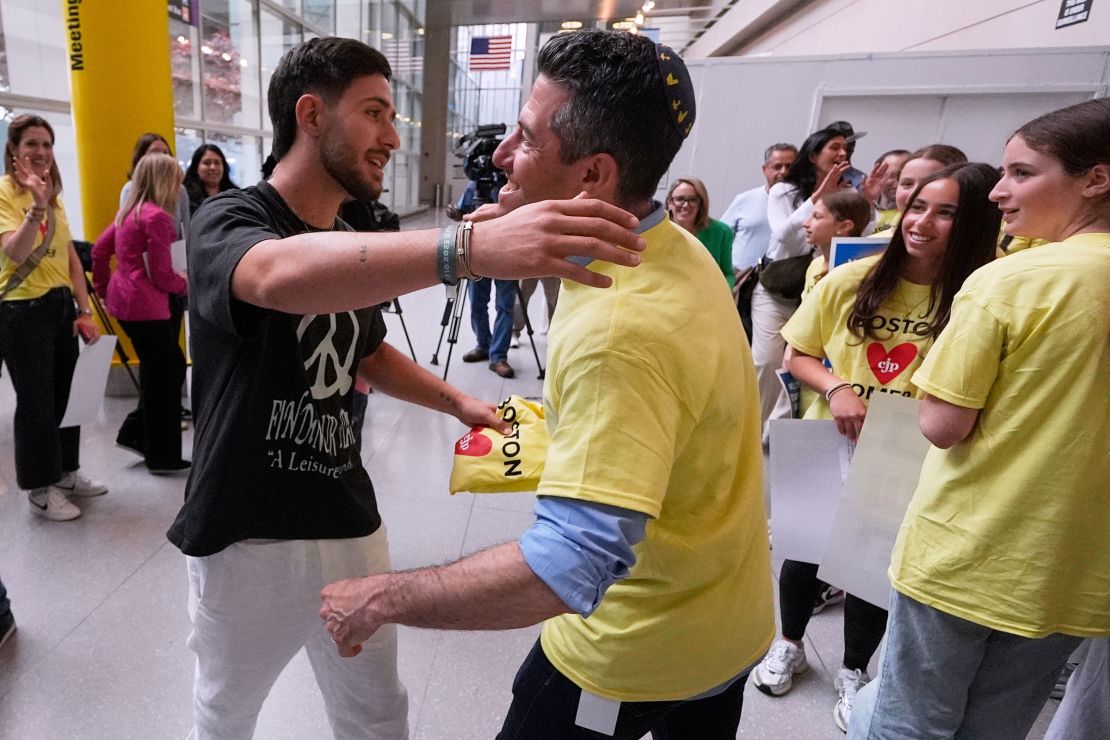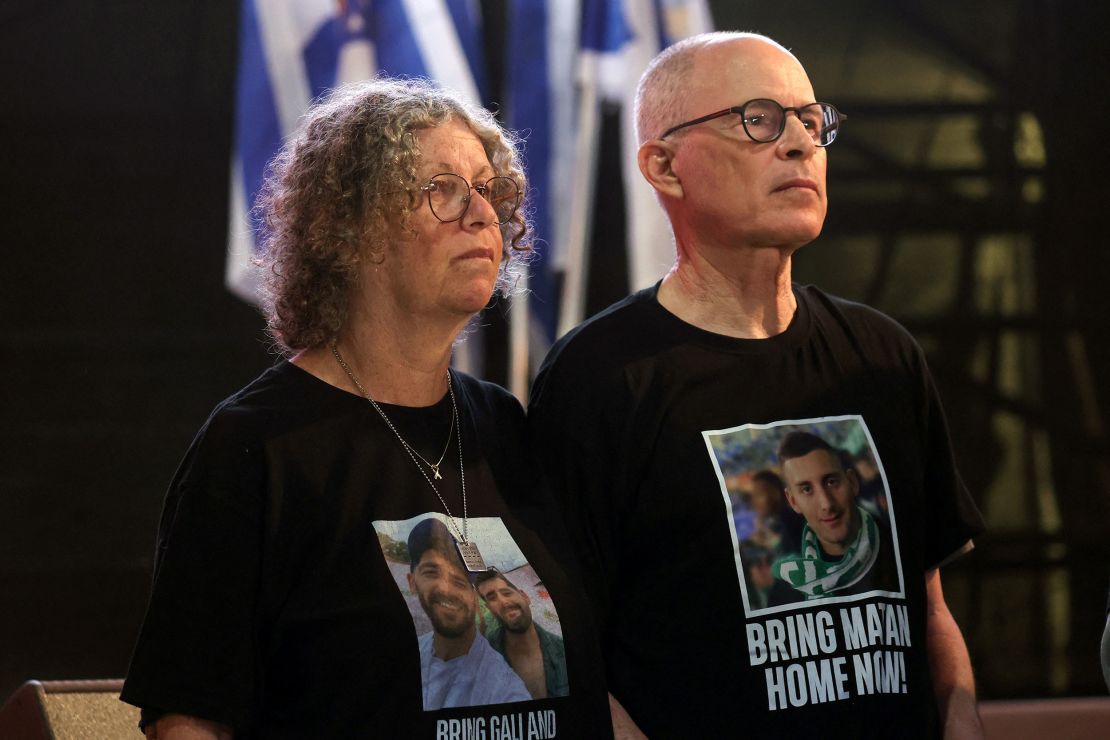
Keith Siegel has been free for nearly four months, but he is still pained by vivid images of his 484 days as a Hamas hostage and of those still held in Gaza’s tunnels.
Siegel isn’t just talking about the physical and psychological abuse he was subjected to by his captors or the suffocating conditions and malnutrition he faced in tunnels deep underground. He’s also terrified that Israel’s intensifying bombardment and ground offensive will kill the remaining living hostages – or drive Hamas to execute them.
Hamas and other militant groups kidnapped 251 people from Israel during the October 7, 2023 terror attacks.
As Israel marks 600 days since the war began, Siegel and dozens of former hostages and relatives are renewing their call for a deal that will end the conflict and secure the release of all 58 still held captive, living and dead. Protesters blocked roads in Tel Aviv on Wednesday and gathered in Hostage Square and in front of the US embassy to put pressure on the Israeli government to make a deal with Hamas and return the remaining hostages.

For Omer Shem Tov, among the last of the hostages to be released before the ceasefire collapsed in March, there is an ever-present feeling of guilt. Every time he eats, he thinks about the hostages not eating. Every time he showers, he knows those still captive in Gaza cannot.
“I can feel it here,” he says, pointing at his throat. “I feel like I’m being choked.”
Like many other released hostages, Siegel and Shem Tov have dedicated much of their newfound freedom to advocating for the release of those left behind.
Most of the Israeli public wants to see a ceasefire deal to bring the remaining hostages home, according to numerous polls, but as those who survived captivity, the freed hostages are the movement’s most powerful voices. They see their advocacy as a near-sacred obligation to those still in Gaza.
“The hostages’ lives are now more critical than eliminating Hamas,” said Shem Tov.
Meanwhile, Siegel has raised awareness about the horrific conditions of captivity he endured and the dangers the remaining hostages face.
Speaking from his daughter’s home in northern Israel, Siegel looked healthier than when he was released in February. He has regained some of the weight he lost in captivity, color has returned to his face and he has been spending time with his family and out in nature. But his mind is never far from the tunnels of Gaza and thoughts of Matan Angrest, a 22-year-old Israeli soldier, and Omri Miran, a 48-year-old father-of-two, with whom he was held.
“I think about them every day. Many times a day. And I worry about them – and I miss them,” Siegel said.
Siegel and Miran were held together for nearly five months, until July 2024, passing the time by talking about their shared taste in music and their love for their families. Miran has two daughters – Alma and Ronni, now aged 2 and 4 – whose names easily rolled off Siegel’s tongue.
“It was very difficult for Omri to think about his daughters growing up without their dad and how hard it was for him to think about him missing their growing-up, their development milestones,” Siegel said.
Miran called out directly to Siegel in a hostage video released by Hamas last month. Siegel said his fellow former captive looked like “a different person… in a negative way.”

Siegel hesitates to describe his relationship with Angrest as one of a father and his son, but it’s clear they built a special bond during the 67 days they were locked in a very small room, sharing a single bed. Angrest helped Siegel improve his Arabic, talked about his love of the Maccabi Haifa soccer team and day-dreamt about sharing a meal together at his parents’ home and seeing a match once they’re free.
Siegel said he, Angrest and Miran used to pray that the Israeli military would rescue them in a daring operation. But that all changed in August when Hamas executed six hostages as Israeli troops closed in on their location. Siegel learned about it in captivity and his dreams quickly turned into nightmares.
“I was afraid that the IDF might try to rescue me and that I might be killed by the captors,” Siegel recalled. “It’s something that worries me in regards to the hostages that are still there.”
He added that he believes Israel’s expanding military operations now increase the threats to the hostages’ lives, even as the Israeli military has pledged to take precautions to avoid harming the remaining captives.
“Hostages were killed from the war,” Siegel said. “I think this can be avoided by getting all of the hostages back. That’s the solution, to get them back – to reach an agreement that will bring them back.”

Shem Tov echoed his fears. The scariest moments in captivity, he said, were when Israeli bombs fell around him, weapons he knew were powerful enough where “your life can be taken in every moment.”
“I was scared of dying from my own people, from my own brothers,” said Shem Tov.
Siegel and Shem Tov have met with US President Donald Trump and Israeli Prime Minister Benjamin Netanyahu and called on both to prioritize reaching a deal to free the hostages. While the Israeli prime minister has made clear he believes defeating Hamas is more important than freeing the hostages, many hostage advocates are placing their hopes in Trump’s hands.
“I am home because of his efforts,” Siegel said. “I believe that he wants to do this and it’s important to him. He has told us that. I ask him to do whatever he can and to do it as soon as possible to get an agreement secured and to get them all back.”
Shem Tov also believed he was freed because of Trump’s efforts. During their meeting in the Oval Office at the White House in March, Shem Tov said Trump told him “that I have a good future ahead of me.”
Shem Tov lost most than 50 pounds in captivity, he said. His food dwindled from just two pitas and some cheese daily at the beginning to a single biscuit.
However, he said his treatment at the hands of Hamas improved after Trump’s election, including receiving more food.
Hamas also “stopped cursing me, stopped spitting on me,” he said.
He frequently talked politics with his captors and said they wanted Kamala Harris to win the US election.
“As soon as Donald Trump was elected, they understood that he wants to bring the hostages back home,” Shem Tov said.

